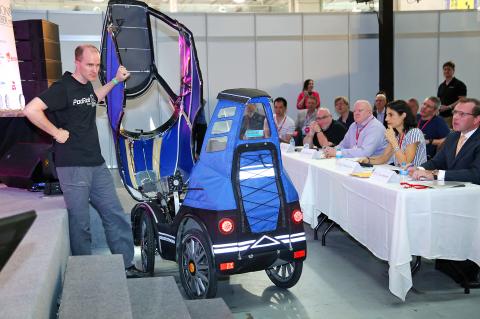John Kellenberger says a lack of access to funding is the greatest obstacle foreign entrepreneurs face when opening a business in Taiwan.
“There’s no way to get regular funding from a bank,” he says. “They’ll kind of laugh [at your proposal], unless you have a local spouse to co-sign for you.”
Kellenberger should know. A long-time Taiwan resident and founder of Reach to Teach, an education company, he’s been through those tough early days of starting a business.

Photo courtesy of Business Next Magazine
That’s why he and Josh Yang (楊智斐), both from the Canadian Chamber of Commerce Taiwan, teamed up with marketing company Enspyre to start Dragon Chamber Taiwan, a competition strictly for foreign startups — the first and only of its kind in Taiwan.
The aim of the event, which is in its second year, is to provide a sorely needed platform for foreign entrepreneurs to collaborate and share ideas.
It’s critical, Kellenberger says, for startups to have access to expert feedback, business mentors and a chance to network with other young companies.

Photo Courtesy of Business next magazine
Dragon Chamber Taiwan, part of Meet Taipei, the largest startup event in Asia, takes its inspiration from the US TV show Shark Tank. Held live on stage, participants have 10 minutes to pitch their startup plan to four “Dragon” judges who will then pepper them with questions, checking for any flaws in the plan.
The judges will evaluate teams in an open discussion on stage, which Yang says will give the audience and participants greater insight into what makes a strong business proposal.
Last year’s winner, Podride, an alternative transport company whose flagship product is a weatherproof four-wheel e-bike, has now raised over US$95,000 on Indiegogo, a crowdfunding Web site.

Photo courtesy of Business Next Magazine
Off the back of last year’s success, the event has expanded and this year will feature more prizes, high-profile judges and a talk by Elias Ek, cofounder of Enspyre and author of How to start a business in Taiwan. Also, with the aim of drawing larger crowds, entry this year will be free.
Kellenberger hopes the event will bring exposure for the teams, but also shine a light on the obstacles that foreign entrepreneurs face in getting started.
“There are lots of foreigners here with great ideas, but without the upfront cash, they can’t get started,” he says.
ENTREPRENEUR VISA
Kellenberger says the new legislation passed by the Tsai Ing-wen (蔡英文) administration aimed at easing entry requirements for foreign startups is “a step in the right direction.”
But, he says, the entrepreneur visa, started in July 2015, hasn’t proven popular.
Indeed, one year after the scheme was launched, only 30 applications had been made and 18 visas issued.
Kellenberger says that applying is a painstaking process, and that cutting red tape further would make a difference.
Right now, he adds, an Alien Resident Card is still tied to a work visa, making it illegal to start a company while still working as an employee. Most must wait until obtaining an Alien Permanent Residency Cards before starting up.
“Relaxing the process further would really help,” he says.
Kellenberger has plans to grow the event in the years to come, including televising and holding it biannually. Most importantly, he wants to double the number of teams.
“The greatest benefit for the teams,” Yang says, “is the feedback and the chance to develop their ideas to the next level.”

Mongolian influencer Anudari Daarya looks effortlessly glamorous and carefree in her social media posts — but the classically trained pianist’s road to acceptance as a transgender artist has been anything but easy. She is one of a growing number of Mongolian LGBTQ youth challenging stereotypes and fighting for acceptance through media representation in the socially conservative country. LGBTQ Mongolians often hide their identities from their employers and colleagues for fear of discrimination, with a survey by the non-profit LGBT Centre Mongolia showing that only 20 percent of people felt comfortable coming out at work. Daarya, 25, said she has faced discrimination since she

It is one of the more remarkable facts of Taiwan history that it was never occupied or claimed by any of the numerous kingdoms of southern China — Han or otherwise — that lay just across the water from it. None of their brilliant ministers ever discovered that Taiwan was a “core interest” of the state whose annexation was “inevitable.” As Paul Kua notes in an excellent monograph laying out how the Portuguese gave Taiwan the name “Formosa,” the first Europeans to express an interest in occupying Taiwan were the Spanish. Tonio Andrade in his seminal work, How Taiwan Became Chinese,

April 21 to April 27 Hsieh Er’s (謝娥) political fortunes were rising fast after she got out of jail and joined the Chinese Nationalist Party (KMT) in December 1945. Not only did she hold key positions in various committees, she was elected the only woman on the Taipei City Council and headed to Nanjing in 1946 as the sole Taiwanese female representative to the National Constituent Assembly. With the support of first lady Soong May-ling (宋美齡), she started the Taipei Women’s Association and Taiwan Provincial Women’s Association, where she

More than 75 years after the publication of Nineteen Eighty-Four, the Orwellian phrase “Big Brother is watching you” has become so familiar to most of the Taiwanese public that even those who haven’t read the novel recognize it. That phrase has now been given a new look by amateur translator Tsiu Ing-sing (周盈成), who recently completed the first full Taiwanese translation of George Orwell’s dystopian classic. Tsiu — who completed the nearly 160,000-word project in his spare time over four years — said his goal was to “prove it possible” that foreign literature could be rendered in Taiwanese. The translation is part of